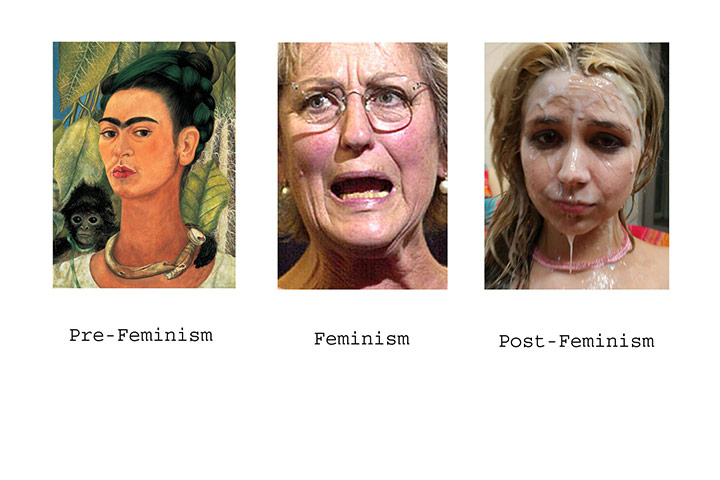 |
| Feminist Postcard Art Auction in the United Kingdom |
I stumbled upon his artwork after reading this short anti-feminism blog post.
In this blog, Carlin Ross argues that Catherine A. MacKinnon and Andrea Dworkin's contribution to the feminist movement had extreme views of anti-porn to the point where feminists were thought of to have become polarized into "anti-sex shrews like the woman in the middle image." Furthermore, Ross expressed deep frustration with how "the likes of" Dworkin and MacKinnon "killed the movement and left us all with a face full of cum".
Whoa...
...
What's going on here?
Is this really how we should interpret the sequence of images on Rusbatch's postcard?
If so, it makes me very upset and disappointed in the artist.
What I am most disappointed at is Ross' narrow and biased viewpoint. And I'm trying my best to hold back all my anger so that I may understand why Ross may feel this way.
After reading her bio, I believe this may be the reason why she may have found great disappointment in Dworkin and McKinnon:
"I grew up in a Christian Fundamentalist home (I know from feminism to the Moral Majority). My father was a minister and I was taught at home. There was no radio, television, and no sex before marriage. My personal experience taught me that sexual repression is used to control and manipulate others."
Ross labeled Dworkin and MacKinnon anti-porn and anti-sex through her frustrations with the Christian Fundamentalist religion tendency to value abstinence before marriage. Dworkin and MacKinnon were not anti-sex or anti-pleasure. Dworkin acknowledged the sexual revolution during the 1960s in the USA.
 |
| Peace and Love |
"Initially, pornography was seen to be a vehicle of liberation simply because it violated laws. And the laws were associated with a repressive adult generation. And anything they tried to stop us from doing, 'we did!'. Pornography was part of that."
Dworkin was attacking the industry. She was critiquing the system. Pimps were making profit off of women's bodies. And by purchasing porn, consumers were contributing and continuing this violent cycle of abusing women in porn. Dworkin analyzed how they were all "responsible for the ways in which women are abused". Pimps exploited the sexual freedom that people have been fighting for and transformed it into a for-profit and "woman-hating industry". This does not mean that Dworkin was against people having sex. She was not against the natural human function of pleasure. She was going against the exploitation of sex.
 |
| Human Right |
For one, you can't ever really say that we are in a post-feminism era just like how we cannot say we are in a post-racism era. Feminism and racism has only shifted in form. Feminism is still alive and well today. So what does Ross and Rusbatch mean by post-feminism? I hope his intentions were along the lines such as "without feminism women are in danger".
How have you interpreted the meaning of his art work?
Where to begin? First, you make a necessary connection by bringing together the concepts of post-race and post-feminism. /Fifty Key Concepts in Gender Studies/ defines post-feminism as the belief "that feminism has achieved its key aims and that there is full equality for all women and a blurring of the boundaries between traditional ascriptions of gender." It's a comforting ideology for those who don't want to take responsibility for gender inequality.
ReplyDeleteRusbatch's postcard disturbs me, and it disturbs me that it's included in the Feminist Art Auction. Who's feminism is that? Some pro-pornography women argue that as long as the dominated individual in porn maintains subjectivity and choice, then porn is not violence or subjugation. But for me, "dominated subject" is an oxymoron and not within feminisms' goals.
I share your anger. First, Frieda Kahlo was a daring artist who developed her voice despite crushing physical and emotional limitations. Germaine Greer, in the second photo, was a voice of Second Wave Feminism who spoke out of compassion for women limited by gender. Sure she was angry at time. We all are. I am right now! But she was also calm and wise. No fair, Rusbatch. And the third photo fills me with pain. Her expression says she did not choose to be the subject of the "money shot," and based on the quantity of fluid dripping from her face, she was outnumbered in the sexual act. Perhaps Rusbatch was being cleverly ironic, but if the message fails, the message fails. Where is the strong art of strong feminists?
I totally agree, and that postcard struck a wrong chord with me. I don't even want to think about what the artist intended to say, because in fact it is not intensions, but the message received that is important. I wonder, however, if by saying we are in a post-feminist world, he was saying something similar to Joan Williams when she talks about intersectionality living past its usefulness. As we have outlived the point in time when these phrases were originated, and today they have completely morphed meanings. What intersectionality meant for a black woman during civil rights is very different than the current discussion of the intersections between gender, sexuality, race, age, SES, and political views. Just as, what it meant to be feminist during the first and even second waves is not what it means today. There is such a social stigma attached to the word "feminist" as if she is some man-hating angry being. There is also the constant victimization that feminism draws attention to within our society, and perhaps that is what Rusbatch was trying to portray. Regardless, it brings up a lot of emotion and anger from its audiences.
ReplyDeleteI share your frustrations. Please read my next post to know about the artist's efforts in creating this postcard! It's so strange and very disappointing!
ReplyDelete